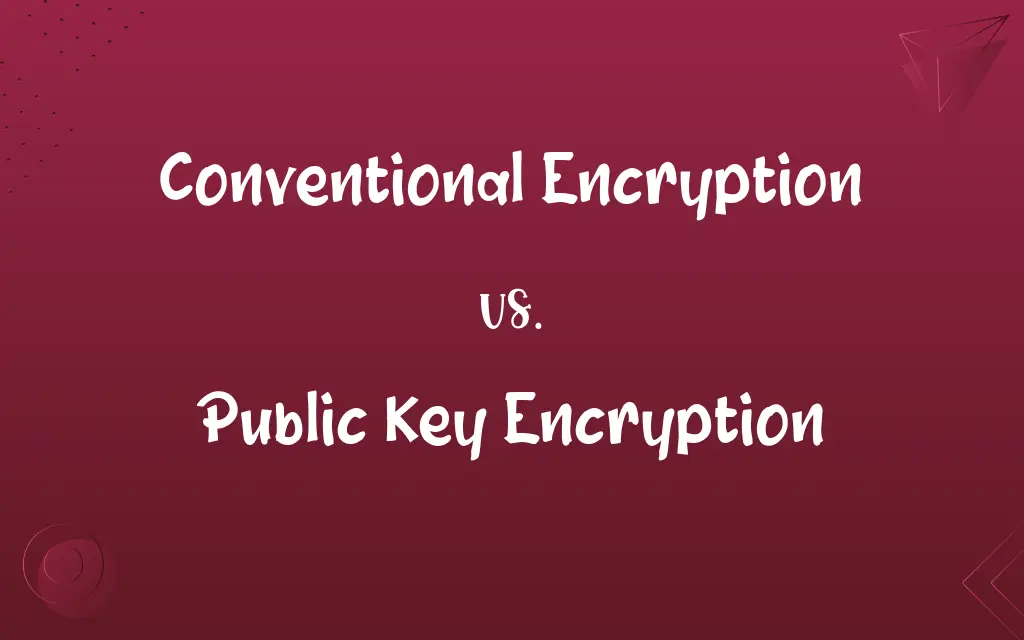Conventional Encryption vs. Public Key Encryption: Know the Difference

By Shumaila Saeed || Published on February 26, 2024
Conventional encryption, also known as symmetric encryption, uses a single key for both encryption and decryption, while public key encryption, or asymmetric encryption, uses a pair of keys – a public key for encryption and a private key for decryption.

Key Differences
Conventional encryption, or symmetric encryption, relies on a single key shared between the sender and receiver for both encrypting and decrypting data. Public key encryption, also known as asymmetric encryption, utilizes a pair of keys, where the public key is used for encryption and the private key for decryption.
Shumaila Saeed
Feb 26, 2024
In conventional encryption, the biggest challenge is the secure exchange of the key, as the same key must be used for both encrypting and decrypting the message. In contrast, public key encryption eliminates the need for sharing private keys, as the public key can be distributed openly without compromising security.
Shumaila Saeed
Feb 26, 2024
Conventional encryption methods are typically faster and require less computational power than public key encryption. However, public key encryption offers a higher level of security, particularly useful for secure communications over the Internet.
Shumaila Saeed
Feb 26, 2024
Common examples of conventional encryption include AES (Advanced Encryption Standard) and DES (Data Encryption Standard). Public key encryption is exemplified by algorithms like RSA (Rivest–Shamir–Adleman) and ECC (Elliptic Curve Cryptography).
Shumaila Saeed
Feb 26, 2024
Conventional encryption is often used for encrypting large volumes of data due to its speed and efficiency. Public key encryption, while slower, is ideal for secure key exchanges and digital signatures in scenarios where high security is paramount.
Shumaila Saeed
Feb 26, 2024
ADVERTISEMENT
Comparison Chart
Key Usage
Uses the same key for encryption and decryption
Uses two keys – a public key for encryption and a private key for decryption
Shumaila Saeed
Feb 26, 2024
Key Sharing
Requires secure sharing of the key between parties
Public key can be shared openly, private key remains secret
Shumaila Saeed
Feb 26, 2024
Speed and Efficiency
Generally faster and more efficient
Slower due to complex algorithms
Shumaila Saeed
Feb 26, 2024
ADVERTISEMENT
Ideal Use Case
Suitable for encrypting large volumes of data
Ideal for secure communications and key exchanges
Shumaila Saeed
Feb 26, 2024
Conventional Encryption and Public Key Encryption Definitions
Conventional Encryption
A type of encryption using the same key for both encrypting and decrypting data.
They used conventional encryption to securely send the file, ensuring both ends had the key.
Shumaila Saeed
Jan 14, 2024
Public Key Encryption
Public key encryption is slower and computationally more intensive than symmetric methods.
Due to its complexity, public key encryption was used sparingly for highly sensitive data.
Shumaila Saeed
Jan 14, 2024
Conventional Encryption
A symmetric encryption method that requires secure key exchange.
To protect their communication, they exchanged the conventional encryption key in person.
Shumaila Saeed
Jan 14, 2024
Public Key Encryption
Eliminates the need for private key exchange, enhancing security in digital communications.
Their system used public key encryption to securely transmit messages over the Internet.
Shumaila Saeed
Jan 14, 2024
ADVERTISEMENT
Conventional Encryption
Commonly used conventional encryption algorithms include AES and DES.
For their financial transactions, they implemented the AES standard of conventional encryption.
Shumaila Saeed
Jan 14, 2024
Public Key Encryption
RSA and ECC are examples of algorithms used in public key encryption.
The website's security relied on RSA, a form of public key encryption, for securing user data.
Shumaila Saeed
Jan 14, 2024
Conventional Encryption
Conventional encryption is known for its speed and efficiency in processing large data.
The company preferred conventional encryption for encrypting their extensive databases.
Shumaila Saeed
Jan 14, 2024
Public Key Encryption
Ideal for scenarios requiring secure key exchanges and digital signatures.
For their contract signing, they used public key encryption to authenticate digital signatures.
Shumaila Saeed
Jan 14, 2024
Conventional Encryption
A system where the security depends on the secrecy of the shared key.
In their symmetric encryption system, the single key's security was paramount.
Shumaila Saeed
Jan 14, 2024
Public Key Encryption
An encryption method using two keys, a public key for encryption and a private key for decryption.
To send a confidential email, he used public key encryption, ensuring only the recipient could decrypt it.
Shumaila Saeed
Jan 14, 2024
Repeatedly Asked Queries
What is Public Key Encryption?
Public key encryption is an asymmetric method using two keys – a public key for encryption and a private key for decryption.
Shumaila Saeed
Feb 26, 2024
How is key sharing different in conventional and public key encryption?
In conventional encryption, the same key must be securely shared, while in public key encryption, the public key can be shared openly.
Shumaila Saeed
Feb 26, 2024
What is Conventional Encryption?
Conventional encryption is a symmetric method using the same key for both encrypting and decrypting data.
Shumaila Saeed
Feb 26, 2024
Which is faster, conventional or public key encryption?
Conventional encryption is generally faster and more efficient than public key encryption.
Shumaila Saeed
Feb 26, 2024
Can the public key be shared without compromising security in public key encryption?
Yes, the public key can be shared openly without compromising the security of the private key in public key encryption.
Shumaila Saeed
Feb 26, 2024
What are common uses of conventional encryption?
Conventional encryption is commonly used for encrypting large volumes of data due to its efficiency.
Shumaila Saeed
Feb 26, 2024
What are examples of public key encryption algorithms?
RSA (Rivest–Shamir–Adleman) and ECC (Elliptic Curve Cryptography) are examples of public key encryption algorithms.
Shumaila Saeed
Feb 26, 2024
Can public key encryption be used for digital signatures?
Yes, public key encryption is often used for creating and verifying digital signatures.
Shumaila Saeed
Feb 26, 2024
What are examples of conventional encryption algorithms?
AES (Advanced Encryption Standard) and DES (Data Encryption Standard) are examples of conventional encryption algorithms.
Shumaila Saeed
Feb 26, 2024
Is public key encryption more computationally intensive than conventional encryption?
Yes, public key encryption is more computationally intensive and slower due to its complex algorithms.
Shumaila Saeed
Feb 26, 2024
What is the main challenge in using conventional encryption?
The main challenge in conventional encryption is securely exchanging and maintaining the secrecy of the key.
Shumaila Saeed
Feb 26, 2024
Is public key encryption suitable for secure internet communications?
Yes, public key encryption is ideal for secure internet communications and key exchanges.
Shumaila Saeed
Feb 26, 2024
Which encryption method is more suitable for quick data transfer?
Conventional encryption is more suitable for quick data transfer due to its faster processing speed.
Shumaila Saeed
Feb 26, 2024
Is RSA used in conventional encryption?
No, RSA (Rivest–Shamir–Adleman) is used in public key encryption.
Shumaila Saeed
Feb 26, 2024
Can the same algorithms be used for both conventional and public key encryption?
No, different algorithms are used for conventional and public key encryption due to their distinct key management and operational mechanisms.
Shumaila Saeed
Feb 26, 2024
Is AES used in public key encryption?
No, AES (Advanced Encryption Standard) is used in conventional encryption, not in public key encryption.
Shumaila Saeed
Feb 26, 2024
Can public key encryption be used for encrypting large volumes of data?
While possible, public key encryption is generally not used for large volumes of data due to its slower speed and higher computational requirements.
Shumaila Saeed
Feb 26, 2024
Is it necessary to keep the encryption key secret in conventional encryption?
Yes, the security of conventional encryption relies on the secrecy of the shared key.
Shumaila Saeed
Feb 26, 2024
How does public key encryption enhance security in digital communications?
Public key encryption enhances security by allowing public key sharing without compromising the private key, ensuring only the intended recipient can decrypt the message.
Shumaila Saeed
Feb 26, 2024
How does public key encryption solve the key exchange problem?
Public key encryption solves the key exchange problem by using two keys, where the public key can be shared openly without compromising security.
Shumaila Saeed
Feb 26, 2024
Share this page
Link for your blog / website
HTML
Link to share via messenger
About Author
Written by
Shumaila SaeedShumaila Saeed, an expert content creator with 6 years of experience, specializes in distilling complex topics into easily digestible comparisons, shining a light on the nuances that both inform and educate readers with clarity and accuracy.









































































